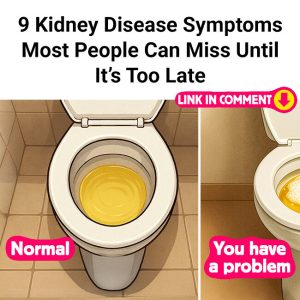Your kidneys may not be in the spotlight when it comes to health, but they’re quietly doing essential work every single day. These bean-shaped organs are responsible for filtering your blood, removing waste through urine, balancing fluids and electrolytes, and even supporting bone health and regulating blood pressure. Despite their crucial role, kidney problems can sneak up on you. Many of the early signs are subtle and easy to overlook or confuse with other health issues. Understanding these early warning signs could make all the difference in catching kidney problems before they become more serious.

One early sign that something might be wrong with your kidneys is a white or yellowish coating on your tongue. While that might not seem like a big deal, it could signal that your body isn’t eliminating waste properly. When your kidneys aren’t functioning efficiently, toxins can start to accumulate, and one of the ways that shows up is through your breath or even your taste. Some people report a metallic taste in their mouths or unusual dryness. If brushing your tongue doesn’t make the coating disappear, it’s a good idea to speak with your doctor.
Another red flag is trouble sleeping. When your kidneys fail to filter waste out of the blood, those toxins linger in your system. This build-up can impact your ability to get restful sleep. Many people with chronic kidney disease report difficulty falling asleep or staying asleep through the night. There’s also an increased risk of sleep apnea — a condition where breathing repeatedly stops and starts during sleep — which can further worsen fatigue and health complications.
Changes in your urination patterns are one of the more obvious symptoms. These can include urinating more frequently or less often than usual. Some people may notice their urine becomes foamy, which could indicate the presence of protein — something healthy kidneys usually keep in the body. Blood in the urine is another serious sign that requires immediate attention. If your urine is darker than usual and you find yourself urinating less, it could point to dehydration or other kidney-related issues. This may be accompanied by grogginess, nausea, or a general sense of feeling unwell. A healthcare professional can run simple tests to assess the concentration of your urine and determine whether your kidneys are functioning as they should.
Another commonly overlooked symptom is a poor appetite. You might chalk it up to stress or just a bad week, but when your body starts rejecting food, it can be linked to a toxic buildup from underperforming kidneys. This loss of appetite might be accompanied by weight loss or nutritional deficiencies over time, making it more serious than it initially appears.
Feeling tired all the time, even after a full night of rest, is another classic sign of kidney issues. Fatigue often stems from a buildup of toxins that the kidneys can no longer filter efficiently. But there’s more to it than just toxins — the kidneys also help produce a hormone that prompts your body to make red blood cells. When that process slows down, it can result in anemia, which leaves you feeling weak, dizzy, or short of breath.
Itchy skin might seem like just a dermatological issue, but it could also be linked to kidney disease. The kidneys regulate minerals in your body, including calcium and phosphorus. When they fail to keep these levels balanced, it can lead to dry, itchy, irritated skin. It might feel like a minor annoyance, but it’s often an external clue to internal dysfunction.
Muscle cramps, particularly at night, are also associated with kidney issues. These cramps are usually caused by imbalances in electrolytes — specifically calcium, sodium, and phosphorus — which are controlled by your kidneys. When these minerals are out of balance, your muscles can contract or spasm involuntarily. If you’ve ruled out dehydration or overexertion, chronic cramps could be worth investigating with your doctor.
Nausea and vomiting are more common in the later stages of kidney problems, but they can still occur earlier on. As waste products build up in the blood, they can affect your digestive system. You might feel queasy throughout the day or even vomit without warning. This isn’t just inconvenient — it can lead to dehydration and further stress on the kidneys.
You might not expect it, but changes in your skin — especially darkening under your arms — could also be a warning sign. This condition, known as acanthosis nigricans, is often associated with insulin resistance, a precursor to type 2 diabetes. Diabetes is one of the leading causes of chronic kidney disease. Although darkened skin in this area can also result from shaving or irritation, if the change happens suddenly or worsens, it’s worth having it evaluated. Your skin can sometimes reflect internal changes before you feel them elsewhere.
Lastly, while not directly related to kidney function, your stool can also provide important clues about your overall health. Though we often don’t talk about it, the color, texture, and frequency of your bowel movements can say a lot about your hydration status, dietary habits, and even how well your organs — including your kidneys — are working together to remove waste.
In short, your kidneys are working hard behind the scenes to keep your body running smoothly. But when they start to falter, your body will usually try to let you know — sometimes in surprising or subtle ways. The key is paying attention. If you notice any of these signs and they persist or worsen, it’s important not to dismiss them. Early intervention can go a long way in preserving kidney health and preventing more serious complications. Always consult with a healthcare provider if you’re concerned. Prevention and timely care are powerful tools in protecting these quiet yet vital organs.





